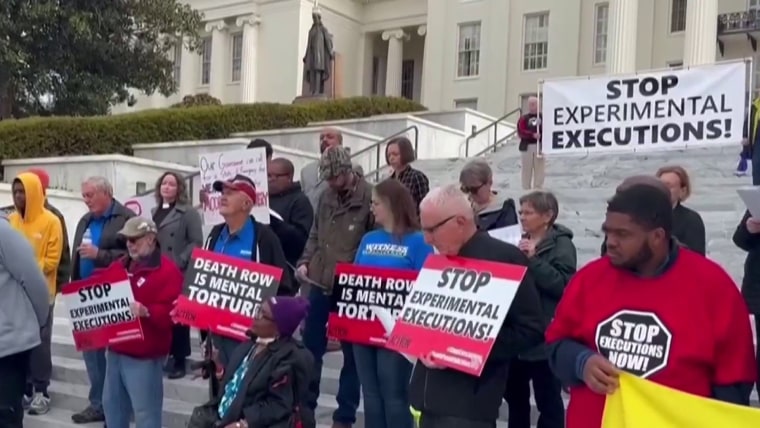The outrage over Alabama using the previously untested method of nitrogen gas to execute 58-year-old Kenneth Eugene Smith on Thursday night isn’t misplaced. The use of any human being as a “guinea pig” for a method of execution, in the words of Supreme Court Justice Sonia Sotomayor, makes the blood boil. But there’s a chance that the focus on Smith, whom Alabama tried and failed to kill in 2022, will distract attention from the much larger outrage: that our country is still pulling human beings from cages and killing them.
The use of any human being as a “guinea pig,” in the words of Supreme Court Justice Sonia Sotomayor, makes the blood boil
Not killing them because they’re threatening someone else. Not killing them in the interest of public safety. But killing them based on the flimsy idea that executions foster closure for victims’ families and deter future crimes. Killing them to avoid being attacked as soft on crime. Killing them in the service of a vengeance that can never be satisfied. Especially not, as was the case Thursday, when this punishment for Elizabeth Sennett’s murderer came more than 35 years after his crime.
The record shows that Sennett’s husband, the Rev. Charles Sennett, hired three men in 1988 to kill his wife so that he could collect her insurance money. A jury found that Smith, then 22, was one of the three who stabbed and beat her to death. Sennett’s husband killed himself shortly thereafter.

Many arguments against the death penalty focus on doubts about the condemned person’s guilt. Statistics also show that who gets executed is heavily influenced by the victim's race and how poor the defendant is. More recently we’ve seen more arguments focus on the likelihood that past executions haven’t been painless and that many have been botched. (For example, Alabama officials poked around Smith’s outstretched body in November 2022 but couldn’t find a vein in which to inject the poison.)

Yes, we can be almost certain that innocent people have been and will be executed. Yes, the statistics about which people get executed and for whose murders contradict all our country’s platitudes about equal protection under the law. And, yes, the drawn out executions that have occurred during the last decade do appear to be cruel, if not unusual, punishment.
But questioning the accuracy of convictions and decrying the uneven application of the penalty or the occasional inability of the states to kill efficiently may make some people think we need execution reform, when what we really need is to get rid of executions altogether. To put it plainly: The state ought not to be in the business of killing people.
To put it plainly: The state ought not to be in the business of killing people.
But it keeps looking to do so. The Justice Department, for example, has announced its intent to seek the death penalty for Payton Gendron, a 20-year-old white man who stands accused of murdering Roberta Drury, Pearl Young, Heyward Patterson, Ruth Whitfield, Celestine Chaney, Aaron Salter Jr., Andre Mackniel, Margus Morrison, Katherine Massey and Geraldine Talley, all of them Black, at Tops Friendly Markets in Buffalo in May 2022.
Though Gendron’s awful crime is emblematic of a spirit of hatred and fear that’s sweeping the country, he shouldn’t be executed, either. Pulling him out of a cage and putting him to death won’t accomplish anything more than Alabama’s ending of Smith’s life Thursday night.
As NBC News has reported, while some relatives of victims are OK with the DOJ’s plan, some aren’t.

Michelle Fryson, who had two relatives murdered, called the DOJ’s decision to pursue death for Gendron a “gut blow.”
“Never did I ever wish that he would have the death penalty,” she said. Fryson doesn’t seem to think closure is a possibility. “And I think that’s the hard part,” she continued. “When something like this magnitude, massacre of this magnitude occurs, everybody wants to be able to bring some closure, if you will, and it is not in sight.”
Because Alabama was using an execution method that had not been tried before, the debate before Smith’s execution centered on how much pain, if any, he’d feel.
The debate before Smith’s execution centered on how much pain, if any, he’d feel.
In September, Alabama state Sen. Trip Pittman, R-Montrose, who sponsored the legislation allowing nitrogen to be used to kill the condemned, told the Alabama Reflector, “You basically black out.” He said, “There is no time for pain or anything else. In fact, nitrous oxide is a way of reducing pain for reducing surgeries.”
However, the Reflector noted that the American Veterinary Medical Association discourages nitrogen being used to euthanize animals because any oxygen that gets mixed into the nitrogen the animal is forced to breathe will prolong death.

According to a reporter from the Montgomery Advertiser who witnessed Smith’s killing, he “appeared to convulse and shake vigorously for about four minutes after the nitrogen gas apparently began flowing.” According to that report, “It was another two to three minutes before he appeared to lose consciousness, all while gasping for air to the extent that the gurney shook several times.”
It might be tempting to use that eyewitness account to challenge the lawmaker who suggested that the death would be quick and painless, but even if that argument were to move him, he’d likely just look for a quicker, more painless way.
The real rebuttal is this: Even if Smith died feeling as if he were floating on a cloud, the state cutting short his life was barbaric.

